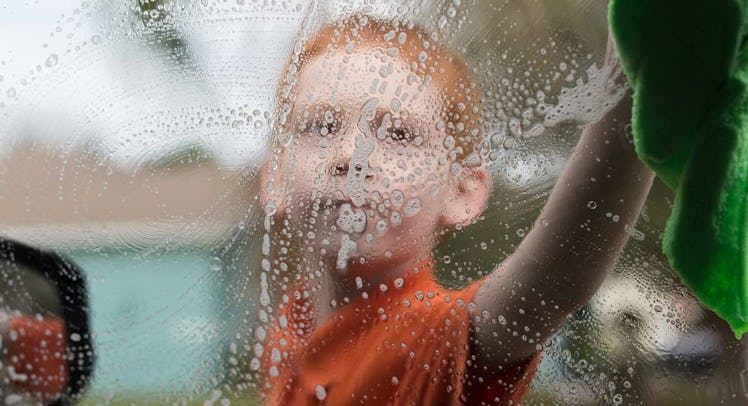How To Give Young Children Chores and Teach Responsibility
Kids are terrible workers, but they need to learn how to get stuff done.

When it comes to chores, the parenting path of least resistance lead to trouble. The easiest way to to get the family room picked up and the dishes put away is to pick up the family room and put away the dishes. Kids are, after all, pretty crappy workers, which is one of several reasons that so few hold down full-time jobs (at least in the States). But self-reliant efficiency has long-term downsides. Will you resent the teenager that doesn’t move to chip in? Yes, yes you will. Will a kindergarteners make a fuss about having to do very basic work? Yes, probably. So you have to choose your poison. The less potent one is the one you take early. And that’s the one that American parents are currently refusing to swallow.
READ MORE: The Fatherly Guide to Chores
“We know is that children are not being given as many chores as the old days,” says Dr. Michele Borba, author of UnSelfie: Why Empathetic Kids Succeed in Our All-About-Me World. “There aren’t consistent chores and there aren’t required chores.”
That’s troubling. In 2015, University of Minnesota professor Marty Rossmann finished a longitudinal survey of 84 children who were studied at four distinct ages in their lives. The inquiry looked at their interaction with parents and household chores during preschool, elementary school, and high school, followed by a brief interview at the age of 20, regarding where they were in life. Rossmann found that the most successful participants, based on college attainment, developed career path, drug use, personal relationships and even IQ, were those who had started doing chores during or before preschool. Those who started in their teens were likely to be less successful.
“All the research says that chores are highly correlated to building character, responsibility, consistency, focus and duty” says Borba. Not to mention it prepares them for what will hopefully be independent domesticity.
But she notes that there are barriers to getting kids to do chores. “It’s harder these days,” Borba concedes. “Kids are just involved in so many things.” For older kids that might include various practices, for children of all ages it includes the creeping spectre of homework. This can give parents a sense of guilt. They may not want give their exhausted progeny more work. And that’s totally fair, but also all the more reason to get on chores early. Preschoolers are not busy training for the big game or an important recital. They’re not up to much if parents are really honest, just eating, growing, and bumping their heads on stuff.
“It’s amazing what your kids are capable of doing,” says Borba. “But there’s a mistake in assuming they can go it alone.”
The Four-Pronged Approach to Giving Children Chores
- Assign chores during or before preschool. A study showed that starting chores in their teens leads to worse outcomes in life.
- Teach new chores clearly. Show the child how you would do the chore, practice it side-by-side, and then step back and let them go it alone.
- Adopt reasonable expectations. Kids shouldn’t be expected to do adult-level work. They should be expected to try hard and follow instructions.
- Avoid paying children for doing chores. Instead, use them to teach that it feels good to be a helpful member of the family.
Borba notes that new chores need to be taught. And that method of teaching should be pretty codified: Start with showing the chore, practice the chore side by side, and then step back and let them go it alone. Kids left to “figure it out,” generally speaking, won’t. Children are better at modeling behavior than extemporizing.
Still, it’s critical that parents have reasonable expectations. Kids should try hard and follow instructions. They should not be expected to do adult-level work. Preschoolers do preschooler work. Kindergarteners do kindergartener work. The pattern isn’t hard to figure out. Expect dust to be missed, streaks to be left, and a dishes to be placed in the rack like those jerks from the office who don’t know glasses shouldn’t go on the bottom shelf.
While some parents may blanch at the idea of a 3-year-old loading the dishwasher, Borba has seen it done. And done well. How was it accomplished? A resourceful mother followed the three teaching steps, only let the kid load the bottom rack and invested in plastic dishes.
Which is to say that giving the youngest kid chores requires commitment, resourcefulness, and an understanding of age appropriateness. For instance 4-year-old can make their bed if all they have to deal with is straightening a big fluffy comforter. A 5-year-old can join a parent in sweeping if they have a kid sized broom. An elementary-aged kid can start doing laundry, cooking and simple gardening tasks. Teens can start using chemicals to clean their bathrooms, which are gross, and the car.
The point is not perfection. Parents are not teaching the chore as much as they are teaching that it feels good to be a helpful member of the family. Eventually, parents can increase the task difficulty. The only thing they can’t do, if they want the exercise to provide more than immediate returns, is pay. Chores, Borba, Rossman, and pretty much every other scholar on the subject agree, should not be paid. Helping the family is its own reward–even when the help doesn’t help much.
This article was originally published on